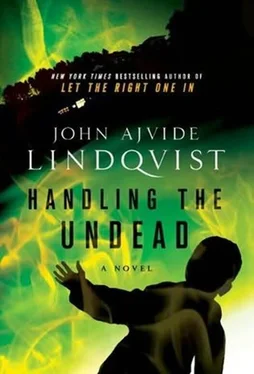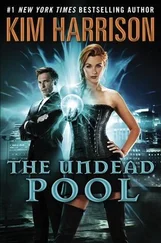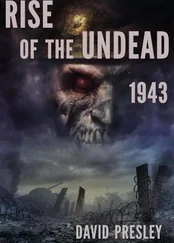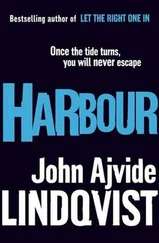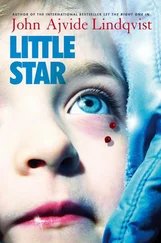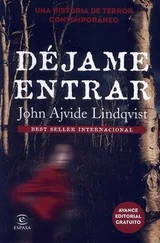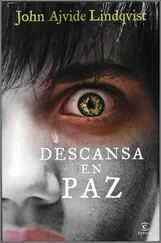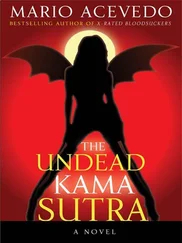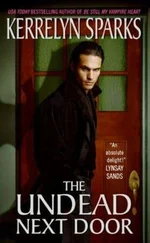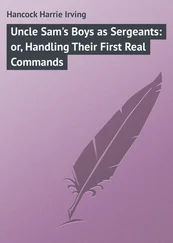John Lindqvist - Handling The Undead
Здесь есть возможность читать онлайн «John Lindqvist - Handling The Undead» весь текст электронной книги совершенно бесплатно (целиком полную версию без сокращений). В некоторых случаях можно слушать аудио, скачать через торрент в формате fb2 и присутствует краткое содержание. Жанр: Триллер, на английском языке. Описание произведения, (предисловие) а так же отзывы посетителей доступны на портале библиотеки ЛибКат.
- Название:Handling The Undead
- Автор:
- Жанр:
- Год:неизвестен
- ISBN:нет данных
- Рейтинг книги:4 / 5. Голосов: 1
-
Избранное:Добавить в избранное
- Отзывы:
-
Ваша оценка:
- 80
- 1
- 2
- 3
- 4
- 5
Handling The Undead: краткое содержание, описание и аннотация
Предлагаем к чтению аннотацию, описание, краткое содержание или предисловие (зависит от того, что написал сам автор книги «Handling The Undead»). Если вы не нашли необходимую информацию о книге — напишите в комментариях, мы постараемся отыскать её.
Handling The Undead — читать онлайн бесплатно полную книгу (весь текст) целиком
Ниже представлен текст книги, разбитый по страницам. Система сохранения места последней прочитанной страницы, позволяет с удобством читать онлайн бесплатно книгу «Handling The Undead», без необходимости каждый раз заново искать на чём Вы остановились. Поставьте закладку, и сможете в любой момент перейти на страницу, на которой закончили чтение.
Интервал:
Закладка:
'Oh. I see. I am terribly… '
'Is she here?'
'Yes.'
Despite his determination, David grew nervous under the
scrutinising gaze she directed at him, as if searching his innards for the trace of a crime. He crossed his arms over his chest to shield himself.
'I want to see her.'
'I'm sorry. I understand how you must-feel. But it's out of the question.'
'Why?'
'Because we are in the process of… examining her.'
David grimaced. He had caught the brief pause in front of the word 'examining'. She had been planning to say something else. He balled his hands into fists, said, 'You can't do that to her!'
The woman tilted her head. 'What do you mean?'
David waved his arms toward the doors the woman had come out of, towards the… wards. 'You can't bloody do an autopsy on someone who is still alive!'
The woman blinked and then did something that David had not been expecting. She burst into laughter. Her little face unfolded in a network of laugh lines that quickly disappeared again. The woman waved her hand, said, 'Excuse me,' pressed her glasses back onto the bridge of her nose arid went on, 'I understand that you are… but you shouldn't be concerned.'
'Oh really, then what are you doing?'
'Exactly what I said. We are examining her.'
'But why are you doing it here?'
'Because… well, for example, I'm a toxicologist, that is, a specialist in detecting foreign substances in dead bodies. We are examining her under the assumption that something has, so to speak, been introduced. Something that should not be present. Exactly as we do in the case of suspected murder.'
'But you… cut people up here. Under normal circumstances.'
The woman wrinkled her nose at this description of her place of work, but nodded and said, 'Yes, we do. Because we have to. But in this case… we also have access to equipment that does not exist elsewhere. That can be used even when we are not… cutting people up.'
David sat down on the vinyl chair, cradled his head in his hands.
Foreign substances… something that has been introduced. He did not understand what they were looking for. He only knew one thing.
'I want to see her.'
'In case it's any comfort to you,' her voice softened somewhat, 'you should know that all of the reliving have been isolated. Until we know more. You are not the only one.'
The corners of David's mouth twitched. 'The bacteria, right?'
'Among other things, yes.'
'And if I don't give a damn about the bacteria? If I say I want to see her anyway?'
'It doesn't matter. You will have to excuse me. I understand how you… '
'I don't think so.' David stood up and walked toward the door. Before he left, he turned back. 'I may be wrong, but I don't believe you have any right to do this. I'm going to… I'm going to do something.'
The woman did not reply. Just looked at David with a pitying, owl-like gaze that made him furious. The door banged mutely against the doorstop as he flung it open and stormed out into the parking lot.
Attachment 1
Newspapers
[From Aftonbladet, 14 August 2002]
Corpses dug up,
try to flee Military open graves
It is six weeks since the 87-year-old died, and his body is in an advanced state of decomposition. But he lives, and early this morning he tried to elude the military cadets who were opening his grave. Shocking scenes such as this were enacted as the military began their work of examining at least 200 graves at the Stockholm Forest Cemetery.
'It is abominable, the worst thing I have ever experienced,' said a young national serviceman.
At half past one this morning, their fears were realised: the buried were alive. Aftonbladet was on the scene when the military began their operation at the Stockholm Forest Cemetery. An 87-year-old man was the first to be uncovered. He lived, although six weeks have passed since his burial. His body was in an advanced state of decomposition. The man attempted to flee the scene, but was restrained. Sections of the man's flesh peeled away at the touch. With the aid of the burial shroud, soldiers were finally able to force the man to the ground. Two people were needed to restrain him.
Tried to flee
'There is no alternative, but it is only a temporary measure,' Colonel Johan Stenberg said about the fence that the cadets had just started to construct. In order to restrain the dead the army engineers erected an enclosure. Meanwhile others were digging up coffins without opening them.
'It isn't pleasant, but what can we do?' Colonel Stenberg said, shrugging. The enclosure was finished at two-thirty in the morning and the cemetery was fiIIed with military personnel. No hospital transports were to be seen. The opening of the coffins was begun and a horrifying sight awaited.
The dead attempted to find their way out, fumbling, uncertain. Many tried to elude the military but were quickly brought back.
Psychological pressure
'This is hell on earth,' a cadet said, sitting apatheticaIIy next to the enclosure. Behind him stood fifteen of the dead, pressed up against the fence. They stared toward us with their empty eye sockets. The cadet threw himself headlong onto the ground, holding his hands over his ears.
'We assumed this would happen,' johan Stenberg said. 'That is why we have so much personnel. I feel sorry for the kid. Psychological pressure.'
It was obvious that the colonel did not mean what he was saying.
The ambulances arrive
Three more corpses were dug up before the ambulances arrived. Quarrels erupted in several quarters. Commanding officers had to intervene in several fights. As we went to press, the situation at the Forest Cemetery had basicaIIy been reduced to chaos. A few of the dead may have escaped. Nearby residents are urged to keep their doors locked. Today the rest of the graves are scheduled to be opened and then the work wiII continue at the rest of the eighteen city cemeteries.
[Editorial, Expressen J
The impossible happened last night. Two thousand Swedes, either declared dead or buried, returned to life. How this is possible and what will happen remains to be seen, but even now a fundamental question may be posed: after this, can we regard death as the end?
Probably not.
One of the definitions of man is that he is an animal who is conscious of the fact that he will die. Perhaps the only one. The events of last night will force us to reformulate the conditions of our own existence.
Death is another word for the cessation of metabolism. If we rule out religious or paranormal explanations, then only one alternative remains: the biological mechanism that is our body has the capacity to restart the process of metabolism. At this point there is no definitive research, but there are many indications.
None of the classic signs of death are valid now. We no longer have a way to declare someone dead. Everyone may come back.
During the 1980s a trend began called cryogenics. Wealthy individuals stipulated in their wills that their bodies should be frozen after death. In the USA, in particular, there are thousands of people resting in this state.
It would not be surprising if the much-maligned cryogenics now experiences an upswing. A solution that allows us to preserve our dead body must at least be discussed.
In all likelihood, researchers will be able to determine what
has caused the dead to become reliving. Possibly they will be
able to repeat the results. A serum against a certain disease can be produced from the blood of a patient who has overcome it. Tonight we have seen thousands of people overcome death. What will we be able to learn?
Our present method of handling the corpse of a human being is basically organised around destroying it. Either quickly, through cremation, or slowly by way of decomposition in the ground. In the future it must be up to each individual to decide what is to be done. In a month, a year, or perhaps ten years-we may find ourselves with a cure for death.
Читать дальшеИнтервал:
Закладка:
Похожие книги на «Handling The Undead»
Представляем Вашему вниманию похожие книги на «Handling The Undead» списком для выбора. Мы отобрали схожую по названию и смыслу литературу в надежде предоставить читателям больше вариантов отыскать новые, интересные, ещё непрочитанные произведения.
Обсуждение, отзывы о книге «Handling The Undead» и просто собственные мнения читателей. Оставьте ваши комментарии, напишите, что Вы думаете о произведении, его смысле или главных героях. Укажите что конкретно понравилось, а что нет, и почему Вы так считаете.
